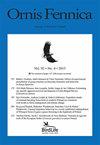Temporal occurrence and species composition of birds on artificial feeding sites maintained for game mammals in the Dinaric Mountains, Slovenia
IF 1.2
4区 生物学
Q2 ORNITHOLOGY
引用次数: 0
Abstract
Artificial feeding is a widely used management tool, but it often attracts nontarget species, including birds, to permanent feeding sites. This study used camera traps to monitor the presence of birds at selected sites used for bear management in Dinaric forest. A large number of bird species (35) were recorded, representing roughly half of all species breeding in the surrounding area. These species were grouped based on monthly and hourly presence, and corresponded to food groups, with most belonging to granivores or scavengers. Some species, such as Pigeons (Columba sp.), Raven (Corvus corax) and Buzzard (Buteo buteo), adapted their presence to the availability of food at the feeding sites, while others were not affected by this. Both Chaffinches (Fringilla coelebs) and Jays (Garrulus glandarius) frequented the feeding sites, but their temporal presence was influenced by their biology rather than by food availability. The Sparrowhawk (Accipiter nisus) also adapted its presence to food availability, and its presence was closely associated with that of the Jay. This study confirms the temporal differences in the use of feeding sites by birds and mammals, which is likely due to their different biology and past management. This can be used to make wildlife management more efficient and reduce the undesirable effects of artificial feeding.斯洛文尼亚迪纳里克山脉狩猎哺乳动物人工饲养场鸟类的时间分布和物种组成
人工饲养是一种广泛使用的管理工具,但它经常吸引包括鸟类在内的非目标物种到永久性饲养场所。这项研究使用相机捕捉器来监测迪纳里克森林中用于熊管理的选定地点是否有鸟类。记录了大量鸟类(35种),约占周边地区所有繁殖物种的一半。这些物种根据每月和每小时的存在进行分组,并对应于食物组,其中大多数属于食草动物或清道夫。一些物种,如鸽子(Columba sp.)、乌鸦(Corvus corax)和蟾蜍(Buteo Buteo),根据觅食地的食物供应情况调整了它们的存在,而其他物种则没有受到影响。Chaffinches(Fringilla coelebs)和Jays(Garulus glandarius)都经常出现在觅食地,但它们的时间存在受到它们的生物学而不是食物供应的影响。麻雀(Accipiter nisus)也适应了食物的供应,它的存在与杰伊的存在密切相关。这项研究证实了鸟类和哺乳动物在使用觅食地方面的时间差异,这可能是由于它们的生物学和过去的管理不同。这可以用来提高野生动物管理的效率,并减少人工饲养的不良影响。
本文章由计算机程序翻译,如有差异,请以英文原文为准。
求助全文
约1分钟内获得全文
求助全文
来源期刊

Ornis Fennica
生物-鸟类学
CiteScore
2.00
自引率
0.00%
发文量
14
审稿时长
>12 weeks
期刊介绍:
Ornis Fennica is a peer-reviewed international ornithological journal published by BirdLife Finland. Ornis Fennica publishes analytical and experimental papers on the ecology, behaviour and biogeography of birds. Ornis Fennica prefers studies concerning Fennoscandian species, but other novel contributions of general interest are most welcome as well.
Ornis Fennica is an open-access journal without page charges for publication. All published articles (from 1924 onwards) are freely available from the journal website. First decisions are usually made within three months of submission.
 求助内容:
求助内容: 应助结果提醒方式:
应助结果提醒方式:


